Japan
Wood Products Prices
Dollar Exchange Rates of 10th
Apr
2023
Japan Yen 133.6
Reports From Japan
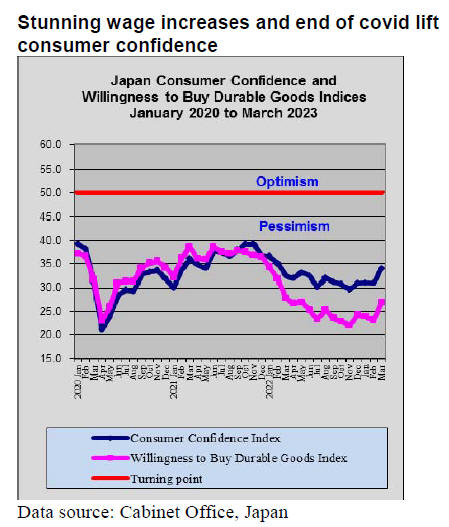
Japan’s consumer confidence gave the government some
optimism as the index rose in March from a month earlier
to the highest level since May 2022. At the core of the
improvement in confidence are the stunning wage
increases agreed by major companies, the prospect that the
covid pandemic is on the wane and that spring came early
this year.
Warnings on volatility amid fresh banking concerns
The government retained its assessment that the economy
is recovering moderately but maintained its warning about
market volatility amid fresh banking concerns prompted
by troubled Credit Suisse and the collapse of two US
banks.
In its March economic report the government cut its
assessment on production for the first time since
December amid slowing international demand and as a
result forecasts for corporate earnings were downgraded
for the first time in nearly three years.
Japan's economy avoided a recession in the final quarter of
2022 but prospects are good as private consumption,
which makes up over half of gross domestic product, has
been rising.
No plans for changes to interest rate policy
Japan’s new Bank of Japan (BoJ) governor, Kazuo Ueda
indicated that the Bank has no plans for major changes in
its ultra-low interest rate policy as slowing global growth
is a risk for a sustained rise in inflation and wages, the
prerequisite for phasing out the controversial monetary
stimulus policy.
Inflation and wage growth are showing of improvement.
After hitting a 41-year high of 4.2% in January, core
consumer inflation remains above 3% as more firms lift
prices to cover rising production costs. To compensate
households for the increase in living costs major firms
have offered wage hikes of nearly 4% this year in annual
labour talks, the fastest pace in about three decades.
See:
https://japantoday.com/category/business/new-boj-headsays-banks-stable-rules-out-major-policy-shift
New programme planned to securing foreign
manpower
A government panel has been reviewing the country’s
programme on foreign technical trainees and has
recommended scrapping the current approach and a launch
of a new programme that emphasises securing manpower.
Japan introduced the current programme in 1993 with the
aim of contributing to skill development for ‘trainees’
from developing countries, however, because of poor
oversight and loopholes in the regulations the programme
has been abused by some Japanese companies with
workers complaining of unpaid wages, long work hours
and other violations.
Labour shortages are becoming more apparent in Japan.
One of the reasons for this shortage of personnel despite
the lackluster economy is that labor supply has reached a
plateau. The inflow of foreign workers decreased due to
control measures imposed after the start of the COVID
pandemic. Another factor behind the stagnation of labour
supply is that labour participation among women and the
elderly, which had been strong before COVID, has stalled.
As economic activity continues to normalise Japan will
find itself facing a serious labour shortage.
See:https://japannews.yomiuri.co.jp/politics/politicsgovernment/20230410-102701/
and
https://www.jri.co.jp/en/reports/jrirj/2023/nishioka/01/
Second quarter to see machinery orders decline
The total value of machinery orders (excluding volatile
ones for ships and those from power companies) received
by manufacturers increased by 2.5% in March, however,
in the January-March period orders declined almost 10%
compared with the previous quarter.
Private-sector machinery orders (excluding volatile ones
for ships and those from power companies) increased a
seasonally adjusted by 7.1% in March but dipped 3.6% in
the first quarter of this year.
In the April-June period private sector machinery orders
have been forecast to drop by 8% from the previous
quarter.
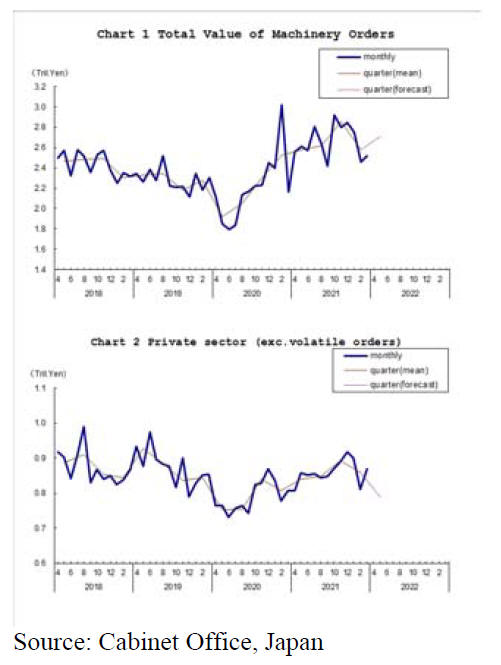
See:
https://www.esri.cao.go.jp/en/stat/juchu/2022/2203juchue.html
Yen slipped on news no change to BoJ policy
After the new BoJ governor reported that the Bank will
maintain current ultra-loose monetary policy that has been
in place for around 10 years. Immediately after the
statement the yen weakened slightly but the downturn was
short lived. On 10 April the yen was at 133 to the US
dollar.
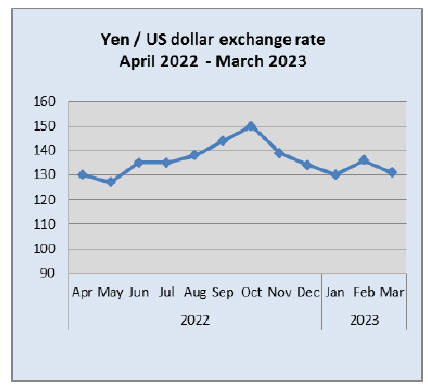
Dicusssions on housing finance for youg
families
The Japanese government has established a panel to
discuss measures to address the country’s falling birthrate.
Under consideration are scrapping the income cap for
child benefits, extending the period of eligibility for
benefits and providing housing support to child-rearing
households.
The idea of housing support has been welcomed by many
as a significant shift away from the usual (and largely
ineffective) cash hand-outs. The move to support young
couples with their housing could result in demand for
smaller first time homes.
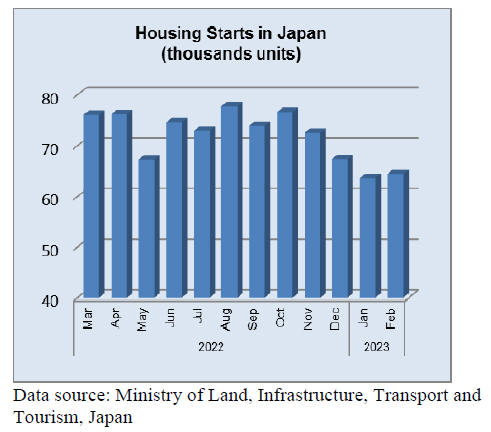
Import update
Assembled wooden flooring imports
There was a massive correction in Japan’s imports of
assembled wooden flooring (HS441871-79) in February
bringing the value of imports back to the same level as in
December 2022.
A possible explanation for the correction (other than the
January data was incorrect) is the strengthening of the yen
against major currencies in January this year which
importers took advantage of. However, the value of
imports of other wood products in January did not show
the same surge as seen with flooring.
The value of Japan’s imports of assembled wooden
flooring (HS441871-79) in February was down 30% year
on year. There has been a steady decline in the value of
imports of assembled wooden flooring since mid 2022.
Month on month, the value of February imports were
down almost 55%.
Three shippers accounted for over 70% of Japan’s imports
of assembled flooring in February, China 44%, Austria
20% and Thailand 8%. There were no shipments from
Vietnam in February most likely because of the Tet
celebrations.
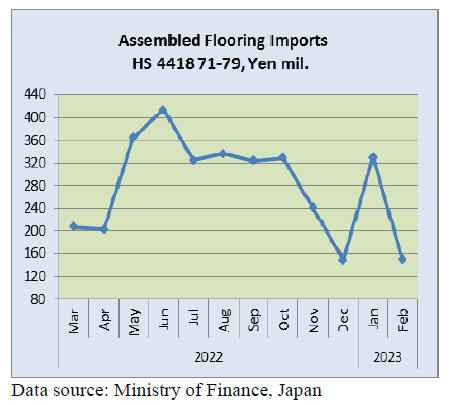
Plywood imports
The volume of plywood imports into Japan has been
declining since the beginning of 2022 as milling of
domestic logs for plywood has increased. In 2022
Malaysia and Indonesia accounted for over 80% of the
volume of Japan’s plywood imports and while this
dominace of imports is being maintained the total volumes
of imports from all sources has dropped.
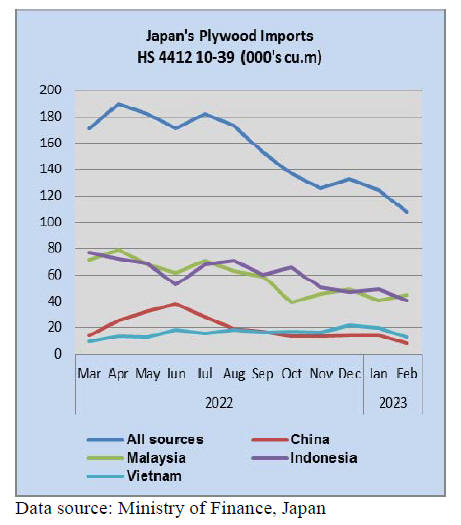
In February 2023 shipments of plywood from Malaysia
were down over 26% year on year and shipments from
Indonesia were down almost 30% over the same period.
Shippers of plywood in China saw a 47% drop in volumes
imported by Japan in February mainly because of the
Chinese New Year celebrations. Month on month there
was a 34% drop in the volume of plywood imported from
Vietnam.
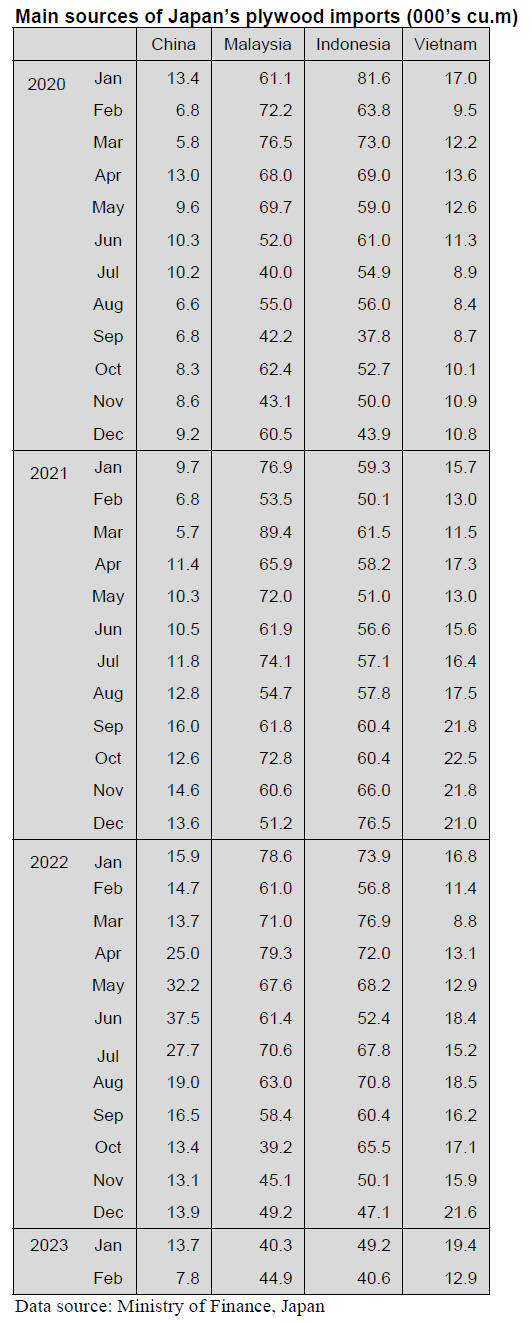
Trade news from the Japan Lumber Reports (JLR)
The Japan Lumber Reports (JLR), a subscription trade
journal published every two weeks in English, is
generously allowing the ITTO Tropical Timber Market
Report to reproduce news on the Japanese market
precisely as it appears in the JLR.
For the JLR report please see:
https://jfpj.jp/japan_lumber_reports/
A new plant in Vietnam
Ed. Inter Co., Ltd. in Hyogo Prefecture finished building a
plant in Vietnam. A completion ceremony was held on
10th, March. Ed. Inter is well known as a wooden toy
manufacturer in Japan. The new plant is located at Bau
Bang Industrial Park in Binh Duong Province. The site of
the plants is 12,000 square meters and the plants building
is 5,000 square meters. The company will increase the
production five times by 2028.
The company has not only certifications for Japan but also
for Europe and the U.S.A. such as CE marking and ASTM
International. The company is also able to use FSC lumber
and will get ISO9001 and BSCI certifications in this year.
METRO Particle secures certifications
METRO Particle Co., Ltd. in Thailand, one of
METROPLY Group’s companies, got certifications of JIS
(Japanese Industrial Standards) on particleboards and lowpressure
melamine boards on 27th, February. METRO
Particle produces particleboards, low-pressure melamine
boards and high-pressure melamine boards.
The particleboards of the company consist of 95% gum
and 5% eucalyptus or fruitwood. The company will
increase using eucalyptus more because the company
owns an afforested area of eucalyptus in southern part of
Bangkok.
Urea resin and melamine resin are used as glue mainly and
sometimes MDI (methylene diphenyl diisocyanate) is used
as glue. The company supplies 80% production to
overseas and 20% of production to Thailand. Productive
capacity of JIS particleboard is 300,000 cbms annually and
of JIS low-pressure melamine board is 900,000 sheets
annually.
The company supplies about 4,000 low-pressure melamine
boards to Japan Kenzai Co., Ltd. in Japan in a month.
Since the company got the certifications of JIS, production
of low-pressure melamine boards will be raised to 40,000
boards from 4,000 boards. There are two more plants in
Thailand.
The company also produces MDF, plywood, hard boards,
LVL, wood veneers, flush doors and laminated floorings.
To start operation at wood biomass power plant
Aioi wood biomass power plant, which was invested by
The Kansai Electric Power Company, Incorporated and
Mitsubishi Corporation Energy Solutions Ltd., has started
an operation on 24th, March in Hyogo Prefecture.
The power output is 200,000 kw. This wood biomass
power plant is the largest plant in Japan.
It supposed to start an operation in the middle of January,
2023 but equipment, which sends wooden pellets to a
boiler, was imperfect so the operation delayed.
An annual electric power generation of the wood biomass
power plant is 1.3 billion kwh and about 550,000 tons of
CO2 will be reduced. About 600,000 – 700,000 tons of
woody pellets will be consumed and natural gas will be
used as a burning assistant.
There are several wood biomass power plants, which are
related to The Kansai Electric Power Company, in Japan.
One of them is Asago biomass power plant built in
December, 2016 in Hyogo Prefecture, which is not in
operation right now, and the power output is 5,600 kw.
The other power plant is Kanda power plant in Fukuoka
Prefecture started an operation in February, 2021 and its
power output is 75,000 kw. Another power plant is Iwaki
biomass power plant started an operation in April, 2022
and its power output is 112,000 kw. Aioi wood biomass
power plants is the fourth biomass power plant for the
company.
The Kansai Electric Power Company will create 5,000,000
kw renewable energy by 2040 and will develop to create
9,000,000 kw renewable energy in the future.
|